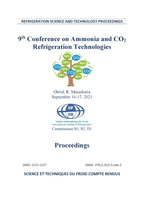
Recommandé par l'IIF / Document IIF
Conception et optimisation du système frigorifique au CO2 pour les bateaux de croisière fonctionnant au GNL.
CO2 refrigeration system design and optimization for LNG driven cruise ships.
Numéro : 0015
Auteurs : SAEED M. Z., HAFNER A., GABRIELII C., TOLSTOREBROV I., WIDELL K. N.
Résumé
The cruise industry is in the evolution of eco-friendly technologies due to strict environmental regulations. Liquified natural gas (LNG) is an alternative marine fuel. Compared to conventional diesel fuels, LNG offers a reduced environmental impact and can serve as a transition towards zero emission. LNG is stored in onboard cryogenic tanks at low temperatures. Various techniques can be applied to vaporize the LNG fuel before feeding it to the gas engine. The recovery of this vaporization energy with air conditioning as a heat source can enhance system performance. On a cruise ship, heating, cooling, and ventilation (HVAC) require an average 40 % of the ship's total energy demand. The natural refrigerant CO2 is an attractive choice due to its compact units, non-toxic nature, and non-flammability, all being primary concerns on a cruise ship. The energy efficiency can be improved by utilizing LNG cold and reducing the need of indirect loops with CO2 as a refrigerant. This work investigates the LNG cold, waste heat recovery potentials, and CO2 refrigeration system for cruise ships.
Documents disponibles
Format PDF
Pages : 8
Disponible
Prix public
20 €
Prix membre*
Gratuit
* meilleur tarif applicable selon le type d'adhésion (voir le détail des avantages des adhésions individuelles et collectives)
Détails
- Titre original : CO2 refrigeration system design and optimization for LNG driven cruise ships.
- Identifiant de la fiche : 30028952
- Langues : Anglais
- Sujet : Alternatives aux HFC
- Source : 9th IIR Conference on Ammonia and CO2 Refrigeration Technologies. Proceedings: Ohrid, North Macedonia, 16-17 September, 2021
- Date d'édition : 16/09/2021
- DOI : http://dx.doi.org/10.18462/iir.nh3-co2.2021.0015
Liens
Voir d'autres communications du même compte rendu (31)
Voir le compte rendu de la conférence
Indexation
-
Thèmes :
CO2;
GNL et GPL;
Transport maritime - Mots-clés : CO2; R744; Navire; GNL; Efficacité énergétique; Étude de cas; Refroidissement
-
Innovative refrigeration concept for passenger ...
- Auteurs : PARDIÑAS A. A., SELVNES H., GABRIELII C., SAEED M. Z.
- Date : 13/06/2022
- Langues : Anglais
- Source : 15th IIR-Gustav Lorentzen Conference on Natural Refrigerants (GL2022). Proceedings. Trondheim, Norway, June 13-15th 2022.
- Formats : PDF
Voir la fiche
-
Analysis of methods to improve the energy effic...
- Auteurs : KHMELNIUK M., TRANDAFILOV V. V., YAKOVLEVA O., YALAMA V.
- Date : 09/2024
- Langues : Anglais
- Source : 11th IIR Conference on Compressors and Refrigerants.
- Formats : PDF
Voir la fiche
-
Small-scale LNG in Europe: LNG ship concepts.
- Auteurs : ØSTENSTAD J.
- Date : 29/09/2005
- Langues : Anglais
- Source : 1st International conference on small-scale LNG in Europe. Conference presentations [CD-ROM].
Voir la fiche
-
Innogas: cost-efficient maritime small-scale di...
- Auteurs : MEEK-HANSEN B.
- Date : 29/09/2005
- Langues : Anglais
- Source : 1st International conference on small-scale LNG in Europe. Conference presentations [CD-ROM].
Voir la fiche
-
Small-scale LNG production facilities.
- Auteurs : GULLAKSEN T.
- Date : 29/09/2005
- Langues : Anglais
- Source : 1st International conference on small-scale LNG in Europe. Conference presentations [CD-ROM].
Voir la fiche
